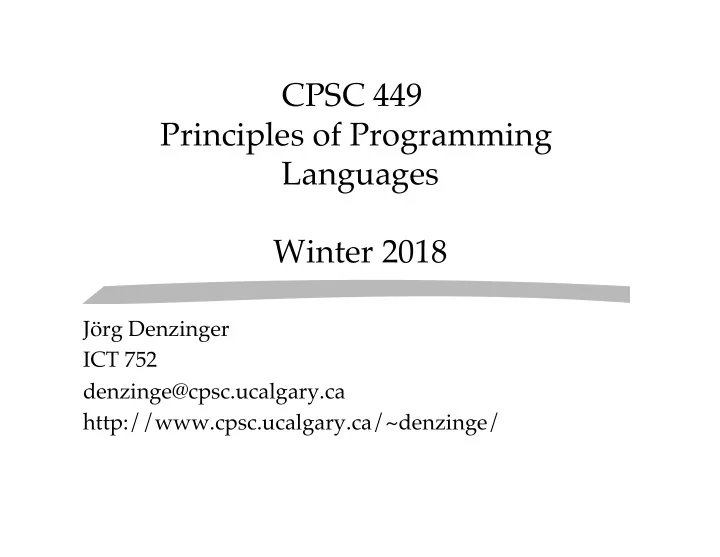

� CPSC 449 � Principles of Programming Languages � Winter 2018 � Jörg Denzinger � ICT 752 � denzinge@cpsc.ucalgary.ca � http://www.cpsc.ucalgary.ca/~denzinge/ �
0. � Organizational and General � � Remarks � n Office hours: TuTh 14:00 - 15:00 � or by appointment � (make use of the "by appointment"!) � n Course web page: � http://www.cpsc.ucalgary.ca/~denzinge/courses/ � � � � � cs449-winter2018.html � n Labs: Start next week. � Participation in first lab absolutely required! � (we put together the teams) � � � CPSC 449 Principles of Programming Languages Jörg Denzinger
Grading � n Exam component: (individually) � � a: � Final � � � 40% � n Assignment component: (in team) � � b: � Java system � � 20% � � c: � Haskell system � 20% � � d: � Prolog system � 20% � n Both components must be passed individually � n You will get grades for each item above: � Course grade = (4a+2b+2c+2d)/10 � � rounded to nearest grade level � if you passed! � CPSC 449 Principles of Programming Languages Jörg Denzinger
Assignments � n The same problem will be solved in three different languages: � ● Java � ● Haskell � ● Prolog � n This semester's problem is � � Simple scheduling problem (8 tasks on 8 � � machines with hard and soft constraints) � n Teams of (around) 5 people � n More details: web site for course � CPSC 449 Principles of Programming Languages Jörg Denzinger
Goals of the course � n Learn to learn a programming language on your own � è caution: assignment deadlines are deceiving! � n Learn to know different programming paradigms � n Know advantages/disadvantages of � ● different (abstract) language constructs � ● different programming paradigms � Not: a course where you learn specific programming languages in the lectures! � CPSC 449 Principles of Programming Languages Jörg Denzinger
(Unofficial) comments (I) � n Learn a programming language on my own! � Why lectures? � To provide abstraction and structure. � n But does this not mean the lectures will be boring? � Some will be (Java lectures most probably, other languages also if you did the learning on your own right; see this as a possibility to check on yourself). � n How should the teams approach the assignments? � There is obvious temptation to split assignments up so that everyone works only on one (especially if team members already know Haskell or PROLOG). � This will be bad for the exam! � CPSC 449 Principles of Programming Languages Jörg Denzinger
(Unofficial) comments (II) � n Why bad for the exam? � The exam will, among other things (abstract concepts), test the familiarity with each of the assignment languages, by making time a factor. � Not having real practice with one of the languages will seriously hurt your performance! � n What if there are people in the team not pulling their weight? � Identify those people (or problems in general) early to the TAs or me, so that we can collect evidence, resp. help resolve the problems. � CPSC 449 Principles of Programming Languages Jörg Denzinger
(Unofficial) comments (III) � n Why will the assignment grades at first be “not final”? � Building a system means working until it fulfills the specifications (or at least until the known errors are fixed). This will also be true for your systems! � After we did the testing, we will determine a grade for the system based on the test results, but expecting that all identified errors will get fixed. If a team decides not to fix the errors, there will be an additional penalty in the form of a grade reduction! � CPSC 449 Principles of Programming Languages Jörg Denzinger
Recommend
More recommend